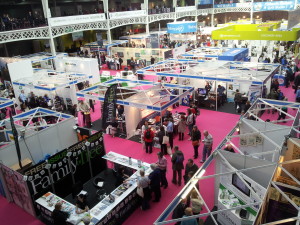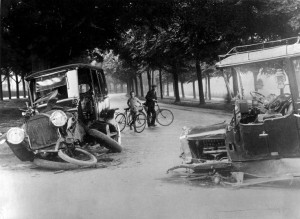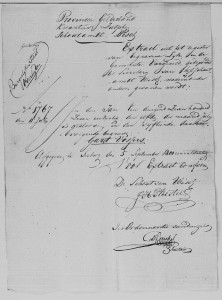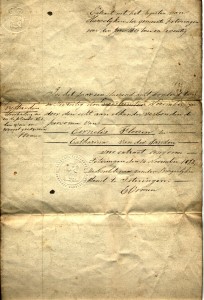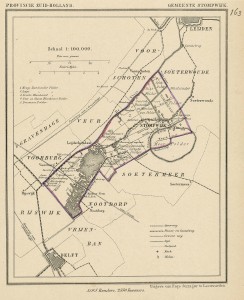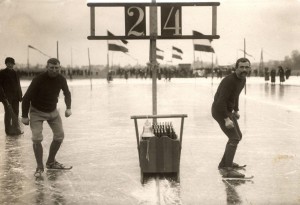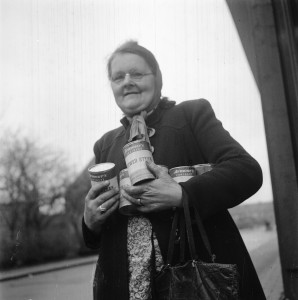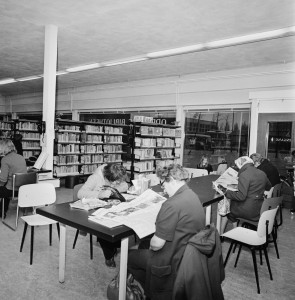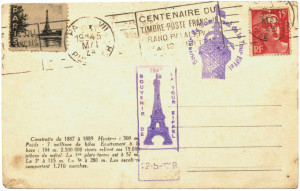Last week, during Who Do You Think You Are? Live! in London, I attended a DNA workshop about Autosomal DNA. Autosomal DNA is the DNA on your non-sex chromomes (22 pairs). I have done autosomal testing with FamilyTreeDNA and 23andme and am always looking for information that helps me to interpret the results. Here are three things that I learned. 1. You need much larger segments than I thought If your DNA overlaps with another person who tested, you can see how long your matching segments … [Read more...]
Archives for February 2014
Quick tip: Try to find evidence to disprove your case
When proving a theory, we look for evidence that supports it. But as diligent researchers, we should look just as hard for evidence that disproves our theory. In fact, searching for evidence that does not fit with our preconceptions can be far more informative than searching for supporting evidence, as demonstrated in this short video. … [Read more...]
Dutch term – archievenoverzicht
Many archives or other repositories will have an online archievenoverzicht, a listing of their collection. The word archievenoverzicht literally means "overview of archives." It will give you a list of the collections, usually organized by categories like population records, court records or tax records. Some archives will only have the archievenoverzicht online, but most will have the finding aids (inventaris) for the underlying collections as well. That will tell you which records are … [Read more...]
Ask the expert
I am currently in London, to attend Who Do You Think You Are Live, the biggest genealogy event in the world. People were already queueing to get in about an hour before the show opened. Once inside, they could listen to lectures, visit one of the dozens of stands or have their DNA sampled to be analyzed. Last year, one of the parts of the program that I most enjoyed was 'Ask the experts.' If you need help solving a brick wall, you can book a free twenty-minute session with an expert. A … [Read more...]
Quick tip: Are your records independent?
The next time you find a birth, marriage and death record that all agree about the name of the person and his date of birth or age, ask yourself: are these documents independent? An extract of the birth record would have been submitted in order to get married. The details from the marriage record may have been copied into the marriage booklet, which in turn may have been used by the informant of the death record. Understanding how these documents are created will help you analyze their value as … [Read more...]
Dutch term – gemeente
A gemeente is a municipality, the lowest administrative unit. The Netherlands currently has 408 municipalities in 12 provinces. Over the last couple of decades, many municipalities merged. In 1812 there were 1,100. Archives of municipalities can be found at a local archive; either a municipal archive specific for that municipality or a regional archive where the collections of several municipalities are kept. For an overview of all the gemeentes, check the website Gemeentegeschiedenis … [Read more...]
Love speed skating? Your ancestors did too!
If there is one sport that the Dutch dominate, it is speed skating. It is the only Olympic sport where the orange team can win all three medals. Our love for speed skating is not surprising if you understand the history of the Dutch landscape. Because large parts of the country are below sea level, the landscape is crisscrossed by little canals to drain the boggy land. Since many roads were inaccessible for large parts of the year, these canals were also the main transport routes. Barges … [Read more...]
Quick tip: Database laws may protect Dutch family trees
Most countries have copyright laws to protect the creative work of authors and artists. Under copyright law, a fact cannot be copyrighted since it doesn't meet the requirement of creativity. In many countries that means that the names, dates and places in a genealogical database are not protected by copyright and may be copied without asking permission. But in the Netherlands, in addition to copyright laws we have database laws that may protect family trees. Many European countries have these … [Read more...]
Dutch term – Bibliotheek
Bibliotheek is the Dutch word for library. Unlike in the US, most libraries don't have a large genealogical collection. Most will just have one or two general genealogical reference books in their collection plus some local history books. Only major libraries will have a subscription to genealogical journals such as Gens Nostra or De Nederlandsche Leeuw [the Dutch Lion]. To find genealogical collections, visit an archive (archief) instead. … [Read more...]
Quick tip: New Worldwide Genealogy Blog
Worldwide Genealogy is a blog where genealogists from around the world tell about their adventures. I am honored to be a part of this group. My first blog post appeared today, as I will be blogging on the 5th of every month. Enjoy! … [Read more...]
